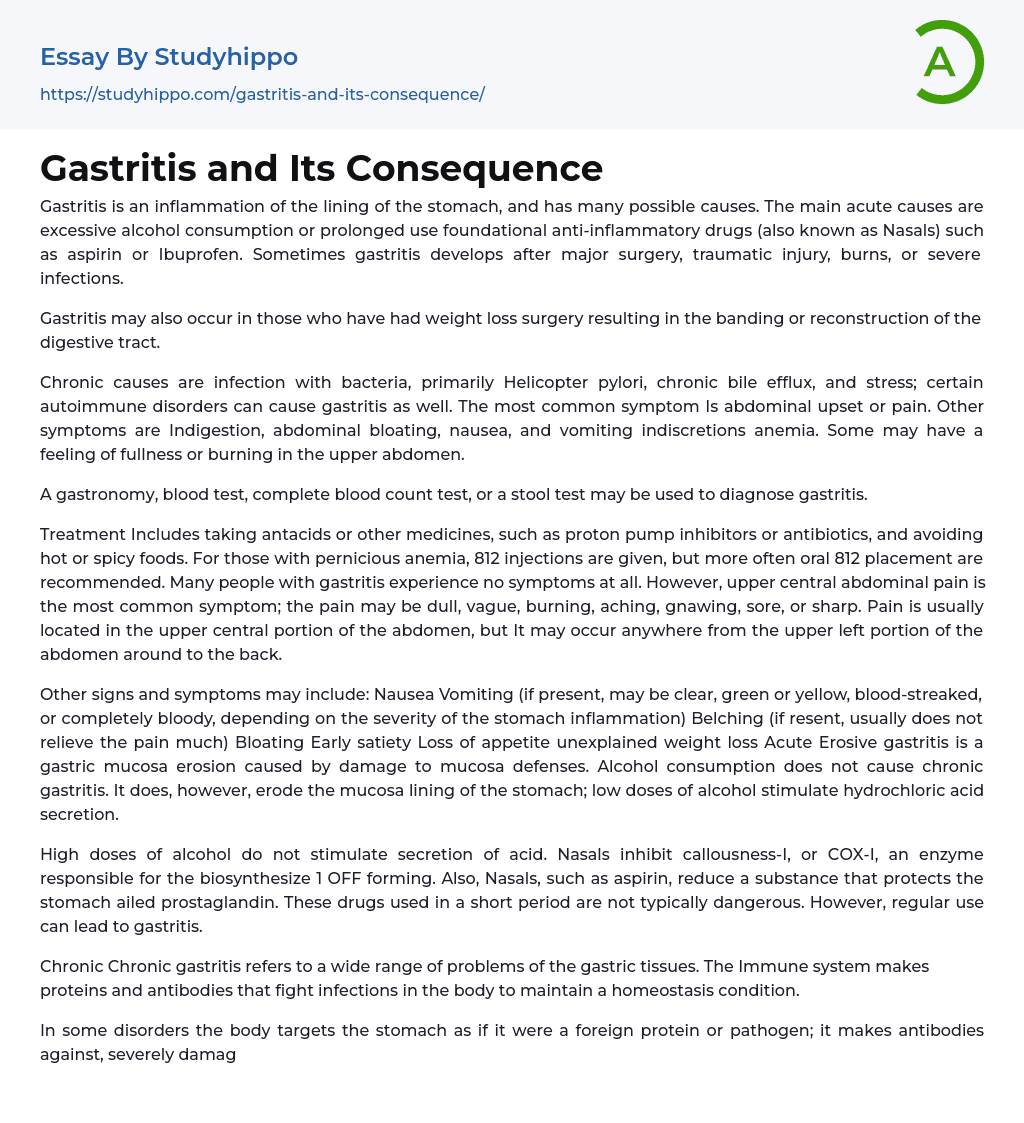The inflammation of the stomach lining known as gastritis can result from a variety of factors, including excessive alcohol consumption, prolonged use of anti-inflammatory medications like Aspirin or Ibuprofen (also referred to as Nasals), major surgery, traumatic injury, burns or severe infections.
Gastritis can be caused by chronic exposure to Helicobacter pylori bacteria, long-term bile efflux, stress, or certain autoimmune disorders. The most common symptom is abdominal discomfort or pain along with indigestion, bloating, nausea, vomiting, anemia and in some cases a feeling of fullness or burning in the upper abdomen.
To treat gastritis, individuals have the option of selecting between antacids, proton pump inhibitors, or antibiotics. It is suggested to avoid spicy or hot foods. In cases of pernicious anemia, oral 812 replacement is preferred over 812 injections. Whil
...e some may not experience symptoms associated with gastritis, the most common symptom reported is upper central abdominal pain that can be described as dull, vague, burning, aching, gnawing, sore or sharp. This type of pain typically occurs in the upper central region of the abdomen but it can also present itself anywhere from the upper left portion of the abdomen all the way to back.
Various indications and manifestations can arise from Acute Erosive gastritis, such as stomach inflammation, unexplained weight loss, loss of appetite, early satiety, bloating, belching, vomiting and nausea. The coloration of the vomit may be determined by the severity of the inflammation presenting itself in varying shades of clearness, greenness or yellowness; or even bloodiness. It should be noted that despite causing erosion to the mucosa lining within the stomach region, chronic gastritis is not caused by alcohol consumption -
in fact low doses have been found to stimulate hydrochloric acid secretion.
Administering high levels of alcohol does not induce acid secretion but Nasals, including aspirin, suppress the activity of the enzyme COX-I, which is in charge of the biosynthesis of a compound called prostaglandin. Furthermore, Nasals lower the levels of prostaglandin, a substance that safeguards the stomach. While these medications may not pose any danger when utilized for a brief duration, consistent use can result in gastritis.
The cause of gastritis can be attributed to various factors such as the immune system mistakenly attacking and damaging the stomach or its lining, after surgery to remove it, or when dysfunction occurs in the stomach due to bile being diverted through the pyloric Alva intended for digestion in the small intestine. Additionally, medical conditions like HIV/AIDS, Crohn's disease, certain connective tissue disorders, liver or kidney failure can also lead to gastritis. Diagnosis is made by patients' descriptions of symptoms or blood tests checking for factors like a blood cell count and presence of H. pylori bacteria.
Gastritis may invoke symptoms linked to H. Pylori bacteria, pregnancy, liver, kidney, gallbladder or pancreas problems. Multiple examinations may be employed to diagnose gastritis, such as urinalysis, stool sample analysis to detect blood presence, x-rays, SEC's endoscope to evaluate inflammation in the stomach lining and mucous erosion. A stomach biopsy can also be performed for testing purposes to detect gastritis or other ailments. Mild gastritis can commonly be remedied with readily available over-the-counter antacids in liquid or tablet form.
Antacids are helpful in alleviating pain quickly by neutralizing stomach acid. However, if antacids alone do not offer sufficient relief, other
medications like condiment, rendition, and instantiated reaffirmation may be prescribed to decrease acid production in the stomach. A more effective approach involves targeting the acid "pumps" within acid-secreting tomcat cells to control stomach acid production.
The medications correlate and monstrosity are psychoactive agents that aim to safeguard the stomach and small intestine tissues. Additionally, they seem to impede H. Pylori activity, similar to proton pump inhibitors.
Bismuth preparations not only safeguard the linings of the stomach and intestines but also demonstrate a potential to hinder the activity of H. Pylori.
- Pregnancy essays
- Death essays
- Asthma essays
- Chronic Pain essays
- Diabetes essays
- Infection essays
- Infertility essays
- Pain essays
- Sexually Transmitted Disease essays
- Cholesterol essays
- Epidemic essays
- Pathogen essays
- Symptom essays
- Water supply essays
- Myocardial Infarction essays
- Chronic essays
- Hypertension essays
- Black Death essays
- Breast Cancer essays
- Down Syndrome essays
- Apoptosis essays
- Tuskegee Syphilis Experiment essays
- Type 2 Diabetes essays
- Cloning essays
- Medical Ethics essays
- Patient essays
- Therapy essays
- drugs essays
- Cannabis essays
- Aspirin essays
- Cardiology essays
- Hemoglobin essays
- Pharmacology essays
- Surgery essays
- alternative medicine essays
- Plastic Surgery essays
- Organ Donation essays
- Vaccines essays
- Medical essays
- Dentist essays
- Psychological Trauma essays
- Physical therapy essays
- Cold essays
- Cocaine essays
- Why Marijuana Should Be Legalized essays
- Drug Abuse essays
- Teenage Drug Abuse essays
- Heart Disease essays
- Artery essays
- Addiction essays




